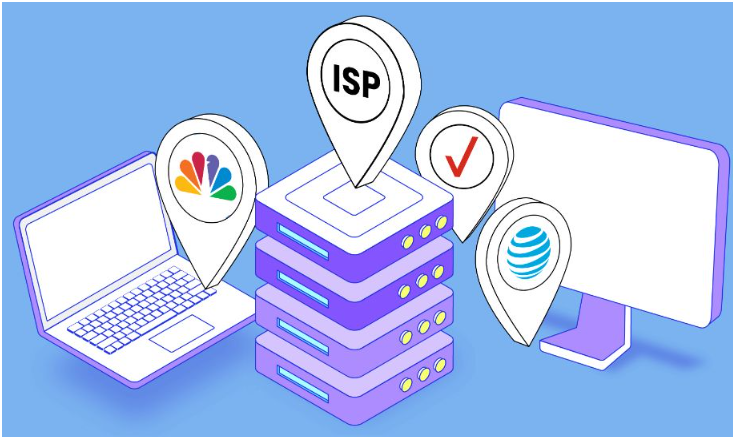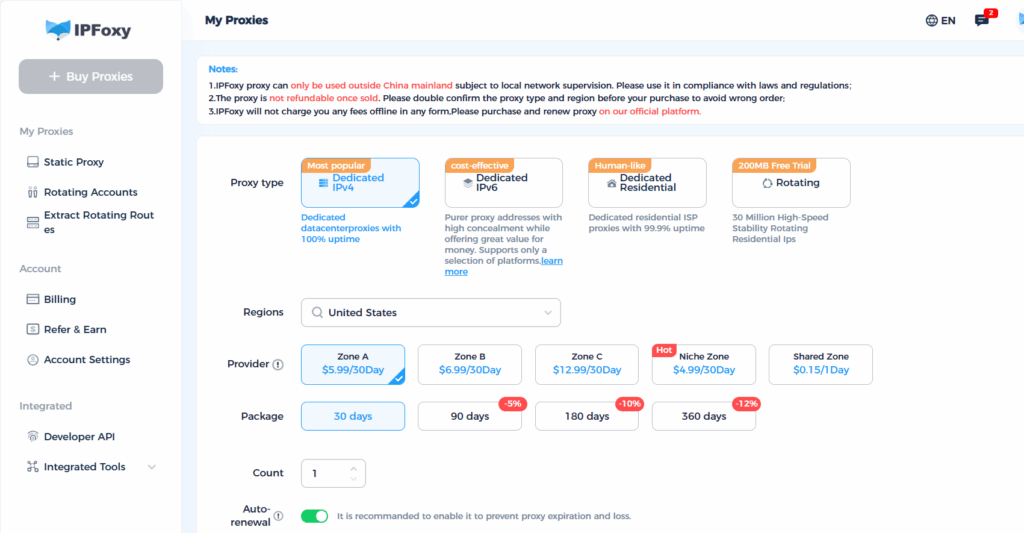With the rapid growth of e-commerce, choosing the right static proxy has become crucial to the success of online stores. A proxy not only affects network speed and stability but also directly impacts store security and resistance to bans. For sellers, there are two main options: static datacenter IPs and static residential IPs. So, which one is better? In this article, IPFoxy provides some practical recommendations to help you choose.
I. Static Datacenter IP
1. Stability and High Speed
Datacenter IPs are provided by data centers, which feature high-quality network equipment and bandwidth to ensure stable and fast data transmission. These IPs usually include static IPv4 and static IPv6 proxies. However, because datacenter IPs are centralized, they can sometimes be more easily identified by e-commerce platforms or search engines as commercial activity, which may lead to additional scrutiny or restrictions.
2. High Security
Data centers typically implement strict security measures to protect their hardware and data. Therefore, using a datacenter IP provides a higher level of network security, reducing potential losses from cyberattacks or data breaches.
However, static datacenter IPs also have their drawbacks. Since these IPs are often used widely, some websites may flag them as automated traffic, increasing the risk of IP bans.
II. Static Residential IP
1. Anonymity and Compliance
A static residential IP is assigned by an Internet Service Provider (ISP) to an individual user. These IPs originate from real household users, simulating genuine user activity and offering strong anonymity. As a result, they are much harder to detect as being used for business purposes. This helps e-commerce stores avoid being restricted or banned by target-market platforms or regulatory authorities that might otherwise detect abnormal activity.
2. High Credibility
Using residential IPs from the same region as the target market can improve localization performance, enhance user experience, and increase trust from both search engines and advertising platforms. This also helps optimize ad performance and prevent ad fraud.
However, static residential IPs typically cost two to three times more than static datacenter IPs. For businesses managing multiple stores, this can significantly raise operational costs. In addition, home networks generally have limited bandwidth and equipment capabilities, which can result in slower connection speeds and higher latency.

III. How to Choose
Choosing between static datacenter IPs and static residential IPs ultimately depends on specific business needs, budget, and the target market’s preference for IP origins.
- If the goal is to increase authenticity and reduce the risk of platform restrictions, residential IPs are the best option.
- If cost is a key concern and you can tolerate a certain level of instability or risk, datacenter IPs are a more economical choice.
For example, platforms such as Mercari Japan, and most U.S. and Russian marketplaces, have stricter requirements for native IPs — in these cases, static residential IPs should be used. For e-commerce live streaming, static residential IPs are also strongly recommended, since live platforms enforce strict monitoring mechanisms and may immediately ban streaming sessions if an IP lacks credibility or purity.

IV. Conclusion
In summary, merchants should have a clear understanding of the characteristics of both types of proxy and make informed choices based on their own business situation. Regardless of the type of IP selected, e-commerce stores must prioritize network security and compliance, ensuring stable growth and long-term success in an increasingly competitive market.


